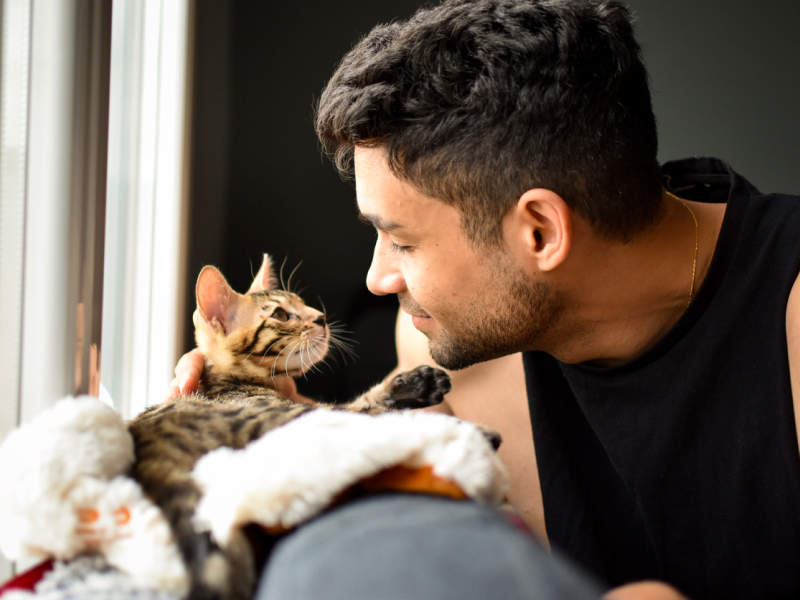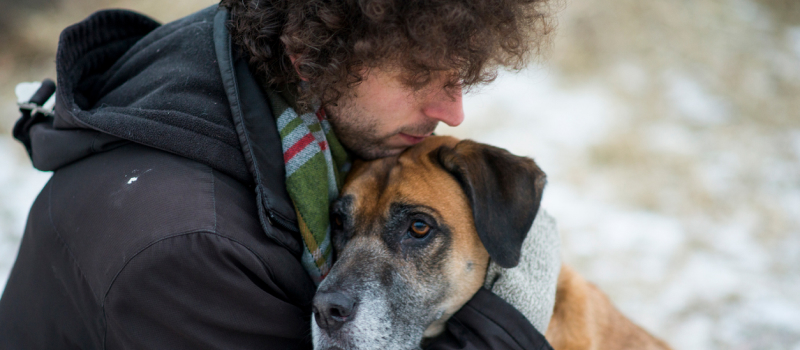
Table of Contents
How to Cope With Pet Grief, According to a Therapist
Written By: Charlie Health Editorial Team

Clinically Reviewed By: Dr. Don Gasparini
March 19, 2024
5 min.
Dr. Caroline Fenkel knows that losing a pet can feel like losing a family member–here’s her tips for how to cope with this devastating loss.
Learn more about our Clinical Review Process
Table of Contents
Most people feel that their pets are as much a part of their family as human members, so when a beloved dog or cat (or other creature) dies, it’s normal to feel overwhelmed with grief and loss. “Pet grief is hard to even talk about because it’s something that can be really, really devastating,” says Dr. Caroline Fenkel, DSW, LCSW, Charlie Health’s Co-Founder and Chief Clinical Officer. With the right support, though, coping with this loss is possible. Below, Dr. Fenkel outlines common signs of pet grief, stages people may face in their grieving process, and strategies for coping with the loss of a beloved pet.
Join the Charlie Health Library
Get mental health updates, research, insights, and resources directly to your inbox.
You can unsubscribe anytime.
What are the signs of pet grief?
When a beloved pet dies, the grief process can take many different forms. Keep in mind that the grieving process takes time, and everyone experiences it differently. Here are some common signs of pet grief that Dr. Fenkel says people should be aware of:
- Sadness or loneliness
- Shock or disbelief
- Anger or irritability
- Guilt
- Physical symptoms (including loss of appetite or difficulty sleeping)
- Avoidance of places that may remind you of your pet
- Intense longing for your pet
- Difficulty concentrating
- Momentarily believing you see or hear your pet
What are the stages of grief for pet loss?
For many pet owners, the stages of grief after losing a pet mirror those experienced when grieving the loss of a human loved one. “If you’re like me, you think of your pets as family members, so losing a pet is losing a family member,” says Dr. Fenkel.
Just like after losing a human loved one, the five stages of grief—denial, anger, bargaining, depression, and acceptance—can provide a framework for understanding the complex emotions experienced after the loss of a pet. These stages aren’t linear, though, and many people may move back and forth between them during the grieving process.

Denial
This initial stage often involves shock and disbelief. It's a defense mechanism that helps people cope with overwhelming emotions. You may have difficulty accepting the reality of your pet's death and may even expect your pet to return.
Anger
As the shock wears off, feelings of anger and resentment may surface. This emotion can be directed towards oneself, others, the veterinarian, or even the pet for leaving. It's a normal reaction to feelings of powerlessness and unfairness.
Bargaining
In this stage, people may try to make deals or negotiate with a higher power in an attempt to change the outcome. They may think, "If only I had done something differently, my pet would still be here." It's a way of grappling with feelings of guilt and regret.
Depression
As the reality of the loss sinks in, people may experience profound sadness, loneliness, and despair. You may withdraw from social interactions, struggle with sleep disturbances, and lose interest in activities you once enjoyed. This stage can be particularly challenging as pet owners confront the full extent of their loss.
Acceptance
In the final stage, pet owners come to terms with the reality of their pet's death. While the pain of the loss may never entirely disappear, you begin to find ways to integrate the loss into your life. You may cherish memories of your pet and find comfort in honoring their memory through rituals or commemorations.
How do you overcome the grief of losing your pet?
Dr. Fenkel recommends keeping their memory alive through conversation and remembrance. For example, she suggests incorporating reminders of your pet into your daily life, like displaying photos around your home.
You can also process the loss of a pet by sharing memories with friends who knew them well. “Talking about your pet might feel sad at first, but eventually, you’ll find yourself having positive feelings because you’ll be thinking about this pet that brought a lot of joy to your life,” says Dr. Fenkel.
If the grief of losing your pet is impacting your ability to get through your daily life, Dr. Fenkel recommends seeking professional help—like setting up a therapy session with a licensed mental health professional. It may also be beneficial to join a pet loss support group, where you can get support from others coping with similar emotions. Here are some mental health resources to help cope with pet grief:
- Gateway Services: Provides 24/7 grief support with trained pet grief counselors.
- Lap of Love: Provides grief courses and 50-minute one-on-one support sessions with a grief counselor.
- Association for Pet Loss and Bereavement: Offers free, virtual pet grief support groups.
- Everlife Support Groups: Organizes in-person pet grief support groups across the U.S. and Canada.
Dealing with the loss of a pet when others devalue your loss
Dealing with the loss of a pet can be an incredibly isolating experience, especially when others fail to recognize the depth of your grief or devalue your loss. "One of the hardest parts of pet grief is when you talk to people about your animal dying, people can sometimes be dismissive or minimizing of it," says Dr. Fenkel.
In this way, societal expectations or stigmas may compound the difficulty of grieving for a pet. "If you want to take off work for a couple of days to grieve your pet, you might feel shame or worry about being looked at differently by co-workers," Dr. Fenkel says. However, she emphasizes that many people (including co-workers) can empathize with what you’re going through. “You are not alone; countless people go through this, and it’s tragic,” she says. “It’s okay to feel sad and lonely after your animal has passed.”
Instead, she emphasizes the importance of seeking support from those who empathize with and validate your feelings—like one of the above resources or a trusted friend or family member. "The people who have been through it can really empathize and be there for you,” says Dr. Fenkel.

Mental health support at Charlie Health
If you or a loved one are struggling with your mental health after the loss of a pet, Charlie Health is here to help. Charlie Health offers a virtual Intensive Outpatient Program (IOP) that provides more than once-weekly mental health treatment for young people dealing with complex mental health conditions. Our expert clinicians incorporate evidence-based therapies into individual counseling, family therapy, and group sessions. With treatment, healing is possible. Fill out the form below or give us a call to start healing today.





